- Home
- Henry David Thoreau
The Essays of Henry D. Thoreau
The Essays of Henry D. Thoreau Read online
Table of Contents
Title Page
INTRODUCTION: - PROPHETIC EXCURSIONS
NATURAL HISTORY OF MASSACHUSETTS
A WINTER WALK
PARADISE (TO BE) REGAINED
KTAADN
CIVIL DISOBEDIENCE
WALKING
SLAVERY IN MASSACHUSETTS
LIFE WITHOUT PRINCIPLE
AUTUMNAL TINTS
THE PURPLE GRASSES
THE RED MAPLE
THE ELM
FALLEN LEAVES
THE SUGAR MAPLE
THE SCARLET OAK
THE SUCCESSION OF FOREST TREES
A PLEA FOR CAPTAIN JOHN BROWN
THE LAST DAYS OF JOHN BROWN
WILD APPLES
THE HISTORY OF THE APPLE TREE
THE WILD APPLE
THE CRAB
HOW THE WILD APPLE GROWS
THE FRUIT, AND ITS FLAVOR
THEIR BEAUTY
THE NAMING OF THEM
THE LAST GLEANING
THE “FROZEN-THAWED” APPLE
ACKNOWLEDGMENTS
A NOTE ON THE SELECTION
ANNOTATIONS
BIBLIOGRAPHY
INDEX
Notes
Copyright Page
INTRODUCTION:
PROPHETIC EXCURSIONS
LEWIS HYDE
I. A TALL WHITE PINE
When I was young and longed to write, I was much in love with Henry D. Thoreau. I loved the plain declarative sentences and flat statements of belief from which he built his work: “Surely joy is the condition of life.” “We must look a long time before we can see.” “What is time but the stuff delay is made of?” “The blue-bird carries the sky on his back.” “They are lovers of law and order who observe the law when the government breaks it.” “It is not indifferent to us which way we walk. There is a right way.”
I liked it that Thoreau sorted life into the sacred and the profane, the true and the trivial, the living and the dead. Take the opening paragraphs of his essay “Walking”:
I wish to speak a word for Nature, for absolute freedom and wildness, as contrasted with a freedom and culture merely civil,—to regard man as an inhabitant, or a part and parcel of Nature, rather than a member of society. I wish to make an extreme statement, if so I may make an emphatic one, for there are enough champions of civilization: the minister and the school committee and every one of you will take care of that.
I have met with but one or two persons in the course of my life who understood the art of Walking, that is, of taking walks,—who had a genius, so to speak, for sauntering, which word is beautifully derived “from idle people who roved about the country, in the Middle Ages, and asked charity, under pretense of going à la Sainte Terre,” to the Holy Land, till the children exclaimed, “There goes a Sainte-Terrer,” a Saunterer, a Holy-Lander. They who never go to the Holy Land in their walks, as they pretend, are indeed mere idlers and vagabonds; but they who do go there are saunterers in the good sense, such as I mean.
The man draws the line and makes a choice. The “merely civil,” “mere idlers”: lowlife surrounds us, but we needn’t be a part of it. That elevated tone I loved, and I loved the demands that followed on it:
We should go forth on the shortest walk … in the spirit of undying adventure, never to return,—prepared to send back our embalmed hearts only as relics to our desolate kingdoms. If you are ready to leave father and mother, and brother and sister, and wife and child and friends, and never see them again,—if you have paid your debts, and made your will, and settled all your affairs, and are a free man, then you are ready for a walk.
I was in my early twenties when I read these essays, and I longed for someone to tell me what to do. My life was not what I wanted. I had quit graduate school in a late-adolescent huff. I wished to be a writer, but I wasn’t a writer. The country was at war; my best friend in jail. I was stuck in a bad marriage, having neither the wisdom to improve it nor the courage to leave. I was terrified of death, convinced my heart might stop at any minute. I lay in bed unable to sleep, rebuilding in fantasy a stone wall I had once built in childhood.
And I loitered near the café tables where old men were saying, “I believe,” and “We must look,” and “There is a right way.” “Believe,” “must,” “is”: what simple, beautiful verbs! I wanted to talk like that.
I did not know it then, but the voice that attracted me to these essays is rightly called prophetic. We have a tradition of prophetic literature that goes back to the Old Testament, of course, and though it is hardly the modern style, prophetic poems, even prophetic novels, can sometimes still be found. Whitman has this voice: he invites us to feel we are among the immortals, large-mannered, spanning continents. As for novels, E. M. Forster once gave a lecture on prophetic fiction, and his examples were Dostoyevsky, Melville, Emily Brontë, and D. H. Lawrence. I would add Flannery O‘Connor: prophets offer revelation, and so did O’Connor; she designed her tales to induce in us that second sight by which we see the workings of an invisible world.
Poems and novels are not what concern me here, however. Here I want to offer a point of entry into Thoreau’s essays, and reflecting on how he pitches his voice—especially in “Walking”—seems a good way to start. Before I begin, I should say that by “prophetic” I do not mean “telling the future.” The prophetic voice has a relationship to time, but telling the future is the least of it. The prophet does not say that the price of oil will go up in October, or that a comet will strike the earth in twenty years. Rather, the prophet speaks of things that will be true in the future because they are true in all time. In 1963, when Martin Luther King, Jr., said that if the “repressed emotions [of African-Americans] are not released in nonviolent ways, they will seek expression through violence,” he was not predicting the race riots of the later 1960s; he was describing the nature of things no matter the decade. Sometimes a prophet’s words do come true, of course, but that may have more to do with whether or not people are paying attention than with any prescience on the prophet’s part.
The prophetic essay has several distinguishing marks. To begin with, it always has a person in it. The mock-modest demand that Thoreau makes at the beginning of Walden states the case well:
In most books, the I, or first person, is omitted; in this it will be retained … . [I]t is, after all, always the first person that is speaking. I should not talk so much about myself if there were any body else whom I knew as well. Unfortunately, I am confined to this theme by the narrowness of my experience. Moreover, I, on my side, require of every writer, first or last, a simple and sincere account of his own life … ; some such account as he would send to his kindred from a distant land.
In the prophetic essay, a person comes forward and addresses us.1 This person is not, however, the self-involved, moody, or obsessed first person who carries on in the journals we keep or the letters we address to estranged lovers. The prophetic first person speaks at the point where the personal touches what is in no way personal. When Dante says, “In the middle of the journey of our life, I found myself in a dark wood,” the shift in pronoun lets us know, if we needed the hint, that he is talking both about himself and about every human being. “In Dostoevsky,” says Forster, “the characters and situations always stand for more than themselves; infinity attends them … . Mitya is—all of us. So is Alyosha, so is Smerdyakov.” Similarly, in Walden and in the essays Thoreau implicitly claims he’s writing not about his life but about the life, the life each of us would lead were we communicants in the church of Nature. The prophetic voice may give a “simple and sincere account” of its story, but it does so in a way that makes us feel we are re
ading the story of the race, not the story of one man or woman.
The second thing about the prophetic voice is that it asks us to imagine being free of the usual bonds of time and space. In regard to time, the rhetoric of prophecy typically invokes daily and seasonal cycles rather than the straight arrow of chronology. “We had a remarkable sunset one day last November,” Thoreau tells us toward the end of “Walking”:
It was such a light as we could not have imagined a moment before, and … [w]hen we rejected that this was not a solitary phenomenon, never to happen again, but that it would happen forever and ever, an infinite number of evenings, … it was more glorious still.
The conceit is typical: the prophet pushes off with a particular day and a particular year, only to swamp them both in eternity, wiping out large sections of history; one November is all Novembers, each evening all evenings.
The prophetic voice alters space as well as time, though here the technique is slightly different. An unobtrusive description at the beginning of Isak Dinesen’s Out of Africa sets a tone for the whole book: “The farm lay at an altitude of over six thousand feet. In the day-time you felt that you had got high up, near to the sun.” Dinesen has a touch of the prophet, and these phrases should alert us to that fact, for the prophetic voice is spoken from high ground. Nothing in Concord stands at six thousand feet, but in “Walking” we find Thoreau climbing up whenever he can. He climbs a tall white pine and finds a flower his townsmen never saw. He climbs a hill and looks down on civilization in miniature:
The farmers and their works are scarcely more obvious than woodchucks and their burrows. Man and his affairs, church and state and school, trade and commerce, and manufactures and agriculture, even politics, … I am pleased to see how little space they occupy in the landscape. Politics is but a narrow field … . I pass from it as from a bean-field into the forest, and it is forgotten. In one half-hour I can walk off to some portion of the earth’s surface where a man does not stand from one year’s end to another, and there, consequently, politics are not, for they are but as the cigar-smoke of a man.
Spoken from on high, the prophetic voice strips the lowlands of their detail. Democrat and Whig, Sunday and Monday, Concord and Charleston—distinctions that preoccupy us in the valley are flattened out as if drawn on a commemorative plate. From Thoreau’s hill the woodchuck and the first selectman may as well occupy the same lodgings.
This does not mean, however, that the prophet is above it all. He may not be constrained by the place of his birth, but the high altitudes have their own, subtler constraints. Thoreau always liked to include a little fantasy about the solar system in his work (“the sun is but a morning star”), and “Walking” is no exception, for at one point he imagines himself higher even than that hill: “The outline which would bound my walks,” he says, “would be … one of those cometary orbits which have been thought to be non-returning curves, … in which my house occupies the place of the sun.” We are so high up now that Earth’s gravity itself has been canceled. And yet the sun’s remains. Solar gravity may be thinner or more delicate, but it still exerts its pull. “There is a subtle magnetism in Nature,” Thoreau says, and we cannot feel it until we get up high. There we drop the accidents of time and place and feel only the constraints of what it is to be human. From high up, everything seems less personal and therefore less of a burden. To achieve the voice he wants, Thoreau ignores or erases his own particular sufferings. The sentence “Surely joy is the condition of life” was written three months after Thoreau’s brother, John, had died of tetanus, and that death had thrown Thoreau into a depression, during which he suffered a full hysterical psychosomatic imitation of the symptoms of tetanus. No “sincere account” with details such as these is ever reported in the work, however; Thoreau pitches his voice above it. He had his familial losses and his disappointments in love, as we all do, but the house he offers in the work is a dwelling for those who wish to live deliberately, and serves to focus cometary orbits.
Extended thus in space and time, the prophetic voice speaks in declarative sentences. It does not debate or analyze. It does not say “several options face us” or “studies must be done.” The prophetic voice dwells in the verb “to be,” from which it draws the simple syntax of belief. “This is the case,” it declares, or “I am I,” or “I am the Way.” Thoreau’s sentences are long and shapely, but they are grounded in such simplicity. “Morning is when I am awake and there is a dawn in me.” “Every walk is a sort of crusade.” “In Wildness is the preservation of the World.”
In the prophetic essay, declarations of belief appear in the foreground, and this alone makes it different from most essays we now read in magazines. The television show Dragnet used to feature a cop named Joe Friday, whose interrogations were punctuated with the phrase “Just the facts, ma’am; just the facts.” Joe Friday is the ghostwriter of most of the essays written in my lifetime. The prophetic essay would never make it through the fact-checking departments of our finer magazines. “In Wildness is the preservation of the World”: There is no way to check that. It certainly does not follow from evidence the way conclusions in an analytic essay do. And yet that does not mean it is not true. Students are often disappointed to discover that when he lived at Walden Pond, Thoreau would go into town to eat meals with his family or the Emersons. It’s a fact: Thoreau was not a hermit. But the facts of the case are not the spirit of the case, and sometimes the spirit is primary. Thoreau did not need pure isolation to describe the solitude of our lives.
The prophet does not stoop to argue or to concede belief to the so-called facts, and these refusals bring us to the dangers, or at least the limitations, of this voice. All the marks of prophecy that I have touched on so far—the extended first person, the lifting of the particular into the eternal, the declarations of simple belief—imply that the divisions, confusions, and ambiguities marking our lives are illusory. Under the spell of the prophetic voice, we are led to believe that there is a simple unity toward which each of us might travel. But there are times we cannot or should not make the move toward unity, either in the self or in society.
To begin with the social example: to the degree that the prophetic voice flattens out diversity, it is at odds with pluralist politics, for it has no model of contention. Or, to say this another way, it has its politics, but they are not presented as such. “Walking” is a political essay (most patently in the way it endorses the westward expansion of the American empire), but Thoreau claims that is not so (the woodland dwellers he eulogizes “are of no politics”). And he seals his claim with a self-protecting rhetoric, saying that he is describing nature, not culture (thus Columbus discovered America with an instinct “akin to the migratory instinct in birds”), asserting that the territory under review is sacred (“the backwoodsman” in America is better situated than “Adam in paradise”), and subordinating all empirical evidence to the insights of sympathy and sempiternal memory. In these and other ways the prophetic voice puts the opposition beyond the pale of speech, or, should oppositional voices arise, it makes it seem as if they were opposed to nature, the sacred, and the wisdom of the ages.
To recast all this in terms of the self: the prophetic voice has little to say about those parts of our lives that are messy or prone to depression. At home on the mountaintop, it is silent about those valleys that are, by definition, “long depressions.” A Thoreauvian prophetic essay leads us on a redemptive journey—about which I shall say more below—but there is a redemption of the valley as well, one that comes from abandoning all hope of getting it together. If you need to come apart, you do not need to listen to the prophetic voice. Stop trying to be a hero. There is a time to fall to pieces, to identify with the confusion of your life as it is, confined absolutely to the present November sunset and your present apartment.
Finally, the prophetic voice lacks humor. Things in the valley may be more confusing than prophecy allows, but they are also funnier. E. M. Forster contrasts prophecy with fantasy, a
nd the novel that is his prime example, Tristram Shandy, reminds us that the comedy of the valley includes digression, coincidence, and muddle. Thoreau has humor to be sure. (I have always wanted to hear the opening of Walden read with a laugh track, especially the bit about how his neighbors torture themselves as if they were penitential Brahmins “measuring with their bodies, like caterpillars, the breadth of vast empires.”) But Thoreau’s jokes typically have an upward thrust. We laugh at the mundane so as to move toward the eternal. We’re not talking about Lenny Bruce or Richard Pryor here. Thoreau never jokes about sex, or about race relations, or about Christians and Jews. He lacks, in short, the humor of pluralism, of the particular, ambiguous, and tattered world—all those jokes that help us live our inexorable divisions in this body, time, and place.
Be this as it may, I listen up sharply when I hear the prophetic voice, for it offers something we cannot get from humor, analysis, or party politics. As I said above, there is a sort of redemptive journey in “Walking,” an “excursion” Thoreau would call it, and it has several stages. At the beginning, as in fairy tales that open with a wicked king and a famine in the land, all is not well in Concord. “Every walk is a sort of crusade,” Thoreau says, “to go forth and reconquer this Holy Land from the hands of the Infidels.” Evil days are upon us. A saunterer’s requisite leisure “comes only by the grace of God,” and few now have such grace. “Some of my townsmen … have described to me … walks which they took ten years ago, in which they were so blessed as to lose themselves for half an hour in the woods; but I know, very well that they have confined themselves to the highway ever since.” Thoreau himself sometimes “walk[s] a mile into the woods bodily, without getting there in spirit … , [t]he thought of some work” running constantly through his head.

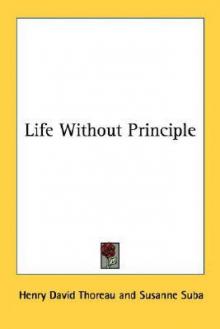 Life Without Principle
Life Without Principle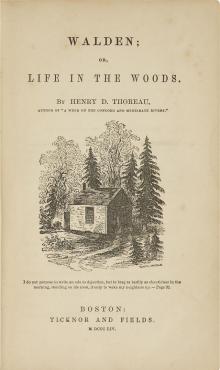 Walden
Walden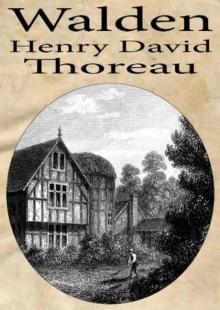 Walden by Henry David Thoreau
Walden by Henry David Thoreau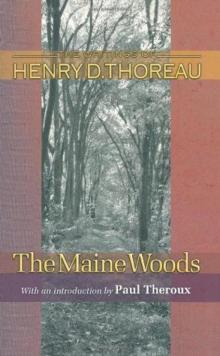 The Maine Woods (Writings of Henry D. Thoreau)
The Maine Woods (Writings of Henry D. Thoreau) The Illustrated Walden
The Illustrated Walden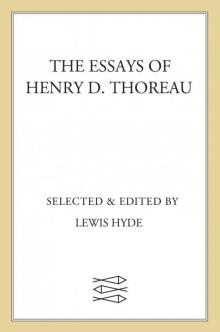 The Essays of Henry D. Thoreau
The Essays of Henry D. Thoreau